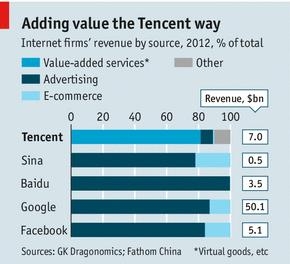(单词翻译:单击)
Sep 21st 2013 | SHANGHAI |From the print edition
IS TENCENT one of the world’s greatest internet firms? There are grounds for scepticism. The Chinese gaming and social-media firm started in the same way many local internet firms have: by copying Western success. QQ, its instant-messaging service, was a clone of ICQ, an Israeli invention acquired by AOL of America. And unlike global internet giants such as Google and Twitter, Tencent still makes its money in its protected home market.
腾讯是世界上最大的互联网公司之一吗?有持怀疑态度的理由。这个中国游戏和社交媒体公司跟许多本土互联网公司一样以同样的方式起步:通过抄袭西方的成功模式。腾讯的即时通讯服务QQ是一家被美国AOL收购的以色列发明的ICQ的翻版。而区别于谷歌和twitter等全球互联网巨头,腾讯仍然只在受保护的本土市场圈钱。
Yet the Chinese firm’s stockmarket valuation briefly crossed the $100 billion mark this week for the first time. Given that the valuation of Facebook, the world’s leading social-media firm, itself crossed that threshold only a few weeks ago, it is reasonable to wonder whether Tencent is worth so much. However, Tencent now has bigger revenues and profits than Facebook. In the first half of this year Tencent enjoyed revenues of $4.5 billion and gross profits of $2.5 billion, whereas Facebook saw revenues of $3.3 billion and gross profits of $935m.
然而,这家中国公司的股市估值这周首次超过了1000亿美元大关。鉴于全球领先的社交媒体公司facebook的估值只在几周之前才跨过这道门槛,所以换衣腾讯的市值是有道理的。然而,腾讯现在的收入和利润都比facebook多。今年前半年腾讯营收达到45亿美元,而总利润达到25亿美元,而facebook营收只有33亿美元,总利润只有9.35亿美元。
The Chinese firm’s market value reflects the phenomenal rise in its share price. A study out this week from the Boston Consulting Group found that Tencent had the highest shareholder total return (share-price appreciation plus dividends) of any large firm globally from 2008 to 2012—topping Amazon and even Apple.
这家中国公司的市场价值反映在其股价的惊人崛起上。这周波士顿咨询集团的一项研究发现,自2008年到2012年,在全球所有大公司中,腾讯拥有最高的股东总回报(股价升值加上分红),超过了亚马逊甚至苹果。
Tencent has created a better business model than its Western peers. Many internet firms build a customer base by giving things away, be they search results or social-networking tools. They then seek to monetise their users, usually turning to online advertising. Google is a glorious example. Other firms try to make e-commerce work. But as the case of revenue-rich but profit-poor Amazon suggests, this can also be a hard slog.
腾讯比起西方同行创造了一个更好的商业模式。许多互联网公司基于送给人们东西作为搜索结果或者社交工具来让其成为消费者。他们接着寻求在他们用户身上套现,通常是提供在线广告。谷歌就是一个光辉典范。其他公司尝试电子商务活动。但是收入丰富但是利润甚微的亚马逊表明这也是一条艰难的路。
Tencent does give its services away: QQ is used by 800m people, and its WeChat social-networking app (which initially resembled America’s WhatsApp) has several hundred million users. What makes it different from Western rivals is the way it uses these to peddle online games and other revenue-raising offerings.
腾讯也给用户提供服务,有8亿人使用QQ,其微信社交应用(最初类似于Whatsapp)有几百万用户。其区别于西方对手的招数在于使用这些工具兜售在线游戏以及其他增加收入的服务。

Once users are hooked on a popular game, Tencent then persuades them to pay for “value-added services” such as fancy weapons, snazzy costumes for their avatars and online VIP rooms. Whereas its peers are still making most of their money from advertising, Fathom China, a research firm, reckons Tencent gets 80% of its revenues from such kit (see chart).
一旦用户迷上一个受欢迎的游戏,腾讯就会劝说他们为增值服务付钱,比如更花哨的武器,他们卡通形象时髦的衣服还有在线VIP房间。鉴于其通航扔人通过广告赚钱,一家调查公司Fathom China认为腾讯通过上述工具的收益占到总收益的80%。
This year China has overtaken America to become the world’s biggest e-commerce market, in terms of sales. It is also now the biggest market for smartphones. This means it may soon have the world’s dominant market in “m-commerce”, purchases on mobile devices.
今年中国超过美国成为世界上销售额最大的电子商务市场。现在中国也是世界上最大的智能手机市场。这意味着中国可能很快成为世界上移动支付市场的主导市场。
Tencent’s main rivals in Chinese m-commerce are Baidu, which dominates search on desktop computers (helped by the government’s suppression of Google) and Alibaba, an e-commerce giant now preparing for a huge share offering. All three have gone on acquisition sprees, in an attempt to lead the market. The big worry for investors is the cost of this arms race.
腾讯在中国移动支付市场的最大对手是百度,主导了桌面电脑搜索市场(受益于中国政府对谷歌的镇压),还有阿里巴巴,现在准备上市的电商巨头。这三个公司正在进行疯狂收购,试图主导市场。投资者最大的担忧就是这场军备竞赛的成本。
Alibaba recently invested $300m in AutoNavi, an online-mapping firm, and nearly $600m in Sina Weibo, China’s equivalent of Twitter. Baidu has been even more ambitious, spending $1.85 billion to buy 91 Wireless, the country’s biggest third-party store for smartphone apps, and $370m for PPS, an online-video firm.
阿里巴巴最近向高德地图投资3亿美元,向新浪微博投资6亿美元。百度更有野心,花费18.5亿美元购买了中国最大的第三方智能手机软件商店91无线,同时花费3.7亿美元购买了在线视频公司PPS。
Tencent may have an edge over its two rivals in m-commerce because of the wild popularity of WeChat, which is used on mobile phones. But to ensure it stays in the race, it is also spending heavily. On September 16th it said it will spend $448m to acquire a big stake in Sogou, an online-search firm; it plans to merge its own flagging search engine (aptly named Soso) into the venture. It had previously invested in Didi Dache, China’s largest taxi-hailing app, and is rumoured to be interested in online travel and dating firms too.
腾讯在移动支付方面比起它的两个竞争对手可能有优势,由于微信在智能手机上的流行。但是为了保证其留在竞争中,腾讯也花费重金。9月16日,腾讯表示它将花费4.48亿美元购买在线搜索公司搜狗一大笔股份,计划将其萎靡不振的搜索引擎搜搜合并到合资企业中。此前,腾讯投资中国最大的打车应用滴滴打车,传言对在线旅游和约会公司也有兴趣。
The three Goliaths are buying up innovative firms because they are too big and bureaucratic to create things themselves, mutter some entrepreneurs (presumably not those being bought out handsomely). A more pressing worry for Tencent’s shareholders is that its lavish spending, on top of heavy investment in improving its unimpressive e-commerce offerings, will eat into profits. Worse, the m-commerce arms race risks distracting it from gaming and value-added services, the cash cows that are paying for everything else. A $100 billion valuation might then seem too rich.
一些企业家说到,这三个巨头购买创新型企业因为他们太大太官僚,很难自己创造事物。大概不是出资那些被收购的公司之口。腾讯股东更担心的是公司花费大量资金,投资改善其不起眼的电子商务产品会侵吞利润。更糟糕的是,移动支付市场的军备竞赛风险分散了其在游戏和增值服务商的注意力,公司正在投资其他东西。1000亿美元的估值可能太高了。


